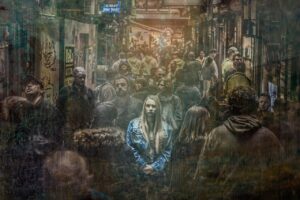Why is so much political vitriol spewed these days, not just from politicians and commentators but from ordinary people? Why is social media full of such extreme rhetoric? Why can’t we have a simple conversation anymore?
Yes, cable news and talk radio hosts have taken advantage of our situation. And yes, there are more than 50,000 Russian-linked social-media accounts fueling outrage by sending automated messages on both sides of issues. But these only feed on a pre-existing condition.
In the last few years I’ve read four books which all give the same answer. Interestingly, two books were by conservatives, one was by a liberal, and one was by an independent observer.
What did all these agree on? That the primary cause of all this contentiousness is not political differences. Rather it is loneliness.
 In his book Them, Republican Senator Ben Sasse notes that since World War II single-person households have tripled to 26 percent. Rates of depression and addiction are increasing. At the same time, “Between 1975 and 1995, membership in social clubs and community organizations such as the PTA, Kiwanis, and Rotary plummeted. Same with labor union membership and regular church attendance” (p. 26). The trend continues with Covid exacerbating the situation. The causes are multiple but the result is what Sasse calls a Loneliness Epidemic.
In his book Them, Republican Senator Ben Sasse notes that since World War II single-person households have tripled to 26 percent. Rates of depression and addiction are increasing. At the same time, “Between 1975 and 1995, membership in social clubs and community organizations such as the PTA, Kiwanis, and Rotary plummeted. Same with labor union membership and regular church attendance” (p. 26). The trend continues with Covid exacerbating the situation. The causes are multiple but the result is what Sasse calls a Loneliness Epidemic.
Second, conservative commentator David Brooks made the same point in The Second Mountain. Brooks thinks our increasing isolation from one another has led us to gravitate toward twisted forms of connection. As Brooks says, tribalism is the evil twin of community. The first is defined by who is our foe. The second by who is our friend.
In a third book, Upheaval, Jared Diamond, a scientist and historian with a more liberal bent, likewise notes that a hundred years ago Americans were involved in book clubs, bridge clubs, church groups, community organizations, town meetings, unions, veteran’s associations and more. This fostered trust and reliance on each other.
Then radio, then TV, then video games, then the internet, and then smart phones increasingly kept people in their homes. As a result, “heavy TV viewers trust other people less, and join fewer voluntary organizations than do people who are not heavy TV viewers” (p. 352). In short, we are increasingly separated from each other, increasingly isolated.
The fourth book comes from independent author Jeffrey Bilbro who is editor of Front Porch Republic. He writes in Reading the Times, “As Robert Nisbet puts it in his classic study, The Quest for Community, an individual thus alienated ‘not only does not feel a part of the social order; he has lost interest in being a part of it.’ Loneliness has now become an epidemic in Western liberal democracies. And, apparently, being lonely is worse for some¬one’s health than being a smoker.” (p. 127)
We are homeless and so search, even yearn, for new types of community, which we are finding on line. “In other words, perhaps it is because we are lonely and detached from our places that we put such outsized importance on the news of the day” (p. 129).
What can we do about this? I’ll take that up in my next installment.
___
Image by Grae Dickason from Pixabay

I have to agree with you, and I’ve been hearing the same thing from other commentators as well. I’ll be interested to hear what you recommend as a solution!
Sarah, I just posted the first installment of some suggestions for combating isolation. Maybe something will resonate for you or others here.
Andy